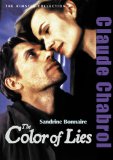
| Cast: | Jacques Gamblin, Sandrine Bonnaire, Antoine de Cannes, Valeria Bruni Tedeschi, Bernard Verley, Bulle Ogier |
| Genre: | Drama |
| Director: | Claude Chabrol |
| Screenplay: | Odile Barski & Claude Chabrol |
| Cinematography: | Eduardo Serra |
| Composer: | Matthieu Chabrol |
Claude Chabrol weaves another variation on his theme of the difference between what the bourgeois say and what they do. Set in a village that used to have fishing (Saint-Malo) and focusing on a painter, it's one of Chabrol's best looking in years, with the very precise framing you'd expect from the main character's artwork and the motif of mirrors used to indict everyone in their dishonesty. Unfortunately, it’s not one of his strongest from a thematic perspective, generally seeming a reaction to the decline of society, but one that’s served up so dispassionately it doesn't strike a strong chord with the audience the way Chabrol's wittier peak works written by Paul Gegauff did.
Jacques Gamblin stars as the gimpy failing painter, his last show was a dozen years ago and now he’s down to private lessens with local schoolgirls, giving a performance that shows he doesn't fit into the shallow judgmental setting in any way. His character Rene Sterne seems like an innocent in many ways, if nothing else he’s the only one who seems to really care that people believe he’s telling the truth, though that’s often a characteristic of a good liar. Rene doesn't sign on to the bourgeois lifestyle and "values", but he’s also someone with obvious motives to do something bad because his health and career are far from where he’d like them to be, and his wife is having an affair with Germain-Roland Desmot (Antoine de Caunes), a glamour boy journalist he detests.
Desmot is the typical current pseudo-reporter, a narcissistic egoist who sees no conflict working for every political leaning since everything he has to say is just meaningless fashionable babble meant to make people think he's special. The film seems to be asking whether anyone is dishonest if everyone is dishonest. Rene’s situation reflects this most obviously, as real his problems and potential motives are meaningless due to him being the only suspect in the rape and murder of his student. She was killed on the way home from his house, so in absence of a smoking semen, the lazy police and sensationalistic media cast their dispersions toward Rene, which quickly turns the small gossipy town against him. No one would be shocked if Rene is guilty because there aren’t many other choices, but you feel sorry for him because the mere possibility of guilt ruins what’s left of his perpetually declining existence.
Chabrol is not particularly interested in the murder mystery as in relating the deceit of murder to the more common deceit's of the society these events can take place in. Everyone is lying in some way, so what’s interesting is the lengths they are capable of going to before their guilt makes them pull back or confess. Each character more or less acts a certain way around a certain person whether they are being honest with them or not, the later almost always being the case. The constant state of dishonesty creates an inner strife in the characters that can only be relieved by telling the truth, but obviously then you gamble on the consequences of the actions you felt you needed to lie about in the first place. The point isn’t as simplistic as the usual truth will set you free, but rather that there’s a sort of unity through honesty because two people can at least share a secret.
Sandrine Bonnaire, surprisingly the only member of the cast that's ever worked with Chabrol before (in La Ceremonie), plays Rene’s wife Vivianne Sterne. She really loves her husband, but she is seduced by the bourgeois lifestyle and wants to fit in. For a while she is able to girlishly flirt with, then more or less have an affair with media darling Desmot without acting any differently toward Rene. Eventually her guilt shows in an excellent scene where she breaks down upon seeing Rene’s new painting of her naked with a mysterious man whose back is to them (Rene claims his identity doesn’t matter). By then it’s irrelevant because Rene already knows and realizes he has to accept what she’s done, but the scene is important in setting the tone for Vivianne to potentially do the same for Rene.
Chabrol is certainly kinder to the main two characters than usual because they are not really bourgeois despite living amongst them. He ultimately shows that what's important is not that they lied to each other and did other bad things but that they stick together. This requires strength we aren't sure Bonnaire possess, the strength to choose her husband over the bourgeois lifestyle, and perhaps any sense of morality she may have had.
The Color of Lies is hardly one of Chabrol's master works, but it's a lot better than I expected given it took half a decade to get any English language distribution. Like most recent Chabrol some people will dislike it because it's so relaxed and generally disinterested in plot to the point what plot there is winds up coming and going without making any lasting impact. I found the film interesting in the typical low key Chabrol way with a good performance by Bonnaire and an excellent one by Gamblin.
   |